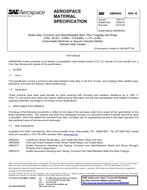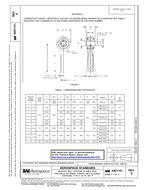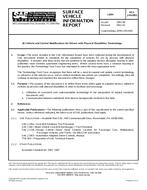The mass of air required to burn a unit mass of fuel with no excess of oxygen or fuel left over is known as the stoichiometric air-fuel ratio. This ratio varies appreciably over the wide range of fuels – gasolines, diesel fuels, and alternative fuels – that might be considered for use in automotive engines.
Although performance of engines operating on different fuels may be compared at the same air-fuel ratio or same fuel-air ratio, it is more appropriate to compare operation at the same equivalence ratio, for which a knowledge of stoichiometric air-fuel ratio is a prerequisite.
This SAE Recommended Practice summarizes the computation of stoichiometric air-fuel ratios from a knowledge of a composition of air and the elemental composition of the fuel without a need for any information on the molecular weight of the fuel.
Product Details
- Published:
- 03/17/2015
- File Size:
- 1 file , 290 KB
- Redline File Size:
- 2 files , 19 MB


